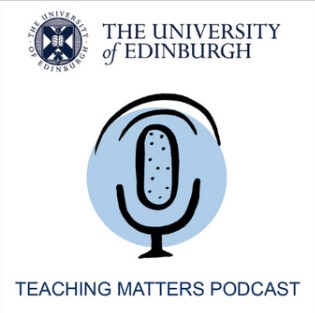
Happy New Year from Teaching Matters! For us, 2022 felt like we could take a proper breathe after a few turbulent years of crisis-mode, with space to feature contributions that involved reflection, celebration, and kindness, as well as critique and provocation. We are delighted to share with our readers a Top Ten blog post listicle, highlighting the most read posts of 2022! As you may note, six out of the 10 posts relate to assessment and feedback – an on-going interest and concern, and one that is strategically linked to the Assessment and Feedback Principles and Priorities developed in 2022. Happy reading!
1. How do we do effective feedback?: A practical example
In the top spot, Dr Jane Hislop and Dr Tim Fawns explain how they “designed a formative assessment approach that would make the natural comparison process between peers explicit and help students to generate their own internal feedback”. One thing that makes us very happy here at Teaching Matters is supporting conversations between colleagues that are sparked by other blog posts. Jane and Tim’s post was written in response to Dr Neil Lent and Professor Tina Harrison’s post: Feedback: From one-way information to an active dialogic process, in an attempt to answer their question, “how do we do effective feedback?”. As one of our most prolific authors, we are sad to lose Tim to Monash University in Australia, but wish him all the best, and you can continue to follow his academic endeavours on Twitter here: @timbocop.
2. Assessment and feedback in conversation with students: Towards co-creating assessment and feedback
Continuing with the Assessment & Feedback theme, Professor Cathy Bovill hits the second place spot with a practical post that provides seven examples of how to include students as partners/co-creators in assessment and feedback development and decisions. Co-creation continues to be a strategic priority for the University, and this is underscored by the positive reactions to Cathy’s keynote talk at the 2022 Learning & Teaching Conference: Shaping the future curriculum with students.
3. CMVM Good Practice Showcase 2022: Equality, diversity and inclusion
In place of the annual, in-person College of Medicine and Veterinary Medicine Good Practice Showcase, Victoria Bennett worked with Teaching Matters to collate a blog post featuring four video presentations related to the theme ‘Equality, diversity and inclusion (EDI)’: EDI in interdisciplinary academic communities; using a lottery to select Student Representatives; scholarship support for surgical trainees; and ethics in Computer Science. EDI remains a very strong topic for colleagues to want to engage with, which was also reflected in our March & April theme: Positive practice in EDI.
4. Prioritising equality, diversity and inclusion activities through the Enhancement Themes
As part this EDI theme, Nichola Kett summarised how the University is engaging with the latest Enhancement Theme: Resilient learning communities. This included employing two ‘Building Community’ PhD Interns to support the Enhancement Themes work: Building community and developing a sense of belonging through PhD internships (Bradely Sharples) and (Yuemiao Ma) Building resilient communities for Postgraduate Research students. The University continues to work closely with the Enhancement Themes, in particular, helping them celebrate their 20th anniversary in 2023.
5. Inclusive, equitable, and fair assessment
Marrying EDI with assessment and feedback, Sam Maccallum addresses the benefits of making assessment practice inclusive by design. They reflect on their own experiences of doing exams during Covid, and leave us with a sobering message that “we are failing too many students with existing policy and practice and must strive to do better… We have a responsibility as a world-leading university to lead the way in inclusive assessment, both for our students and the wider sector.” From the popularity of their post, I am sure many agree.
6. Assessment, feedback and their digital futures
Bringing in some great debate and thought provocation to sixth place, Professor Sian Bayne and Professor Tim Drysdale discuss the opportunities, as well as the risks, of assessment-related technologies. They highlight issues, risks, and opportunities around ‘contract cheating’ services, AI, plagiarism detection software, and unmanageable academic workload.
7. The ‘Decolonising the Curriculum’ Hub
As part of the latest Enhancement Theme: Resilient learning communities (see no. 4), Rayya Ghul’s post introduces the Decolonising the Curriculum Hub, which she created through her work in the Enhancement’s collaborative cluster: Decolonising the Curriculum (in the time of the pandemic). This SharePoint hub acts as a central space to collect existing resources from across the University and share practice in how to decolonise the curriculum, as well as a place colleagues can go for help and practical advice.
8. Feedback: From one-way information to an active dialogic process
In this post, Neil Lent and Tina Harrison reflect on the role and function of feedback in current and future learning opportunities. They highlight that feedback is a process that should be, “dialogic, involving interaction between students and teachers and also peer to peer interaction between students.”
Cathy Bovill and Celeste McLaughlin land in ninth place with their post summarising their findings from an international, collaborative research project (funded by Universitas 21) that sought to understand the changes to teaching practices that took place during the initial period of the Covid-19 pandemic. You can download the report from the Supporting online students web page.
Last but not least, Phil Marston writes a very useful post to help staff and students demystify marking schemes, rubrics and their descriptors. Phil summarises his post with this clear message: “The single most helpful thing in this situation is to have a conversation with the students about what they think the descriptors are describing.”
Top 3 podcast episodes
The Teaching Matters’ podcast hit 10,000 downloads at the end of 2022! Over the last year, we recorded and published 16 podcast episodes, which included the series: Wikimedia, MediaHopper Create; Teaching Awards 2022; and Uncovering UNCOVER. My favourite element of podcasting is learning from our incredible student interns (this year, we worked with Eric Berger and Aiswarya Jayamohan) who record, edit and produce fascinating conversations with staff and students. Below are the Top 3 downloaded episodes in 2022:
1. Wikimedia and Academia: University staff (Kirsty Lingstadt), students (Hannah Rothmann, Grace King and Lucy Parfitt) and Wikimedians (Ewan McAndrew and Richard Nevell) discuss Wikimedia’s current role within academia and hypothesise what that role can be in the future.
2. UNCOVERing good evidence reviews: Ruth McQuillan and Marshall Dozier (core members of UNCOVER), describe key features of a good evidence review, and provide tips to novice reviewers on how to create a good evidence review.
3. Wikipedia: Where are the women?: A 13-minute conversation between Lucy Crompton-Reid (Chief Executive of Wikimedia UK) Linda Bauld (Professor of Public Health), Sarah Lappin, (head of the ‘Edinburgh Women in STEM’ Society), and Áine Kavanagh (a former reproductive biology student at the University) to discuss the under-representation of women on Wikipedia pages.
Teaching Matters’ Newsletter
We publish a monthly newsletter that looks back at a recent Teaching Matters blog series. The newsletter’s ‘5 Things’ section offers a handful of insights into the series from the Teaching Matters team, while the Collegiate Commentary section features valuable reflections from our colleagues at other Universities. The newsletter also spotlights content you might have missed, such as posts beyond the blog series and episodes from our podcast.

Our most read newsletter of 2022 showcased the March and April series on ‘Examples of positive practices in Equality, Diversity and Inclusion (EDI)’: Five positive steps towards good practice in EDI, which featured a Collegiate Commentary from Dr Peter Lau at the University of Hong Kong.
Sign up to receive future editions directly in your inbox!
THE Campus partnership
We continue our thriving partnership with The Times Higher Education blog: THE Campus. Many of our contributors will only need to slightly re-work their Teaching Matters post in order for it to be published on THE Campus, if the theme is suitable (for example, Victoria Madden reworked her blog post Digital citizenship and the importance of creating safe and inclusive online learning spaces for THE Campus: Fostering responsible digital citizenship). Please get in touch if you would like to discuss this opportunity.
Upcoming in 2023
This year, we look forward to Learning & Teaching Enhancement Theme series that include: Celebrating 20 years of Enhancement Themes, Student Voice, Academic Development approaches in Edinburgh Futures Institute (EFI), and EFI Year 1 Fusion, as well as Hot Topics showcasing outputs from this year’s Teaching Awards, Learning & Teaching Conference, and Student Partnership Agreement fund.
Please get in touch if you have an idea for a podcast episode, a blog post, or a theme for a series! We’d love to hear from you: teachingmatters@ed.ac.uk.
Editor’s note
It remains an absolute privilege for me to read and learn about the wonderful teaching taking place within the University, and to support staff and student to showcase their work to a wider – and international – audience. The impact of blogging has helped many contributors develop their professional portfolio, and impact the trajectory of their academic careers. This year, I am delighted to be able to share some evidence-based research (through a PTAS-funded project: ‘Conversations, community and collegiality: Exploring the effect of blogging on teaching and learning practice’) the makes visible the impact of academic blogging on: sharing practice’; professional development; and culture change in learning and teaching. Watch this space!
For now, we wish you health and happiness for 2023. Happy reading and listening, and another huge thank you to all our readers and contributors.
The Teaching Matters Team
Previous Top Ten blog posts:
- Top ten Teaching Matters posts of 2021
- Top Ten Teaching Matters Posts of 2020
- Top ten most read Teaching Matters blog posts of 2019
- Top ten most read Teaching Matters blog posts of 2018
 Jenny Scoles
Jenny Scoles
Dr Jenny Scoles is the lead editor of Teaching Matters. She is an Academic Developer (Learning and Teaching Enhancement), and a Senior Fellow HEA, in the Institute for Academic Development. She provides pedagogical support for University course and programme design. Her interests include student engagement, sharing practice, professional learning, and sociomaterial methodologies.


